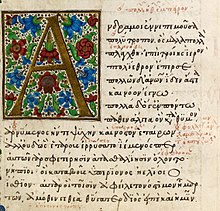
Back Odussee Afrikaans Odyssee ALS ኦዴሲያ Amharic A Odisea AN ओडेसी ANP أوديسة Arabic الاوديسا ARZ ওডিছী Assamese Odisea AST Odusseia AVK
| Odyssey | |
|---|---|
| by Homer | |
 15th-century manuscript of Book I written by scribe John Rhosos (British Museum) | |
| Original title | Ὀδύσσεια |
| Translator | George Chapman and others; see English translations of Homer |
| Written | c. 8th century BC |
| Language | Homeric Greek |
| Genre(s) | Epic poetry |
| Published in English | 1614 |
| Lines | 12,109 |
| Preceded by | The Iliad |
| Metre | Dactylic hexameter |
| Full text | |
The Odyssey (/ˈɒdɪsi/;[1] Ancient Greek: Ὀδύσσεια, romanized: Odýsseia)[2][3] is one of two major ancient Greek epic poems attributed to Homer. It is one of the oldest works of literature still widely read by modern audiences. Like the Iliad, the Odyssey is divided into 24 books. It follows the Greek hero Odysseus, king of Ithaca, and his journey home after the Trojan War. After the war, which lasted ten years, his journey from Troy to Ithaca, via Africa and southern Europe, lasted for ten additional years during which time he encountered many perils and all of his crewmates were killed. In his absence, Odysseus was assumed dead, and his wife Penelope and son Telemachus had to contend with a group of unruly suitors who were competing for Penelope's hand in marriage.
The Odyssey was originally composed in Homeric Greek in around the 8th or 7th century BC and, by the mid-6th century BC, had become part of the Greek literary canon. In antiquity, Homer's authorship of the poem was not questioned, but contemporary scholarship predominantly assumes that the Iliad and the Odyssey were composed independently and that the stories formed as part of a long oral tradition. Given widespread illiteracy, the poem was performed by an aoidos or rhapsode and was more likely to be heard than read.
Crucial themes in the poem include the ideas of nostos (νόστος; "return"), wandering, xenia (ξενία; "guest-friendship"), testing, and omens. Scholars still reflect on the narrative significance of certain groups in the poem, such as women and slaves, who have a more prominent role in the epic than in many other works of ancient literature. This focus is especially remarkable when contrasted with the Iliad, which centres the exploits of soldiers and kings during the Trojan War.
The Odyssey is regarded as one of the most significant works of the Western canon. The first English translation of the Odyssey was in the 16th century. Adaptations and re-imaginings continue to be produced across a wide variety of media. In 2018, when BBC Culture polled experts around the world to find literature's most enduring narrative, the Odyssey topped the list.[4]
- ^ "Odyssey Archived 16 February 2021 at the Wayback Machine". Cambridge Dictionary. Cambridge University Press, 2023.
- ^ Ὀδύσσεια. Liddell, Henry George; Scott, Robert; A Greek–English Lexicon at the Perseus Project.
- ^ Harper, Douglas. "odyssey". Online Etymology Dictionary.
- ^ Cite error: The named reference
:6was invoked but never defined (see the help page).